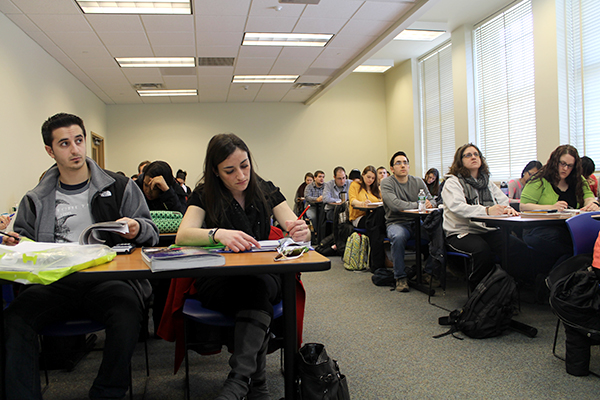
After a seven-year long process, the SUNY New Paltz School of Business has earned initial accreditation from the Association to Advance Collegiate Schools of Business (AACSB) International.
Dean of the School of Business Hadi Salavitabar said he learned of the achievement, which just less than 5 percent of the world’s business schools receive, on Feb. 4.
The AACSB, which formed in 1916, is an organization that works with leading business schools and has about 1,300 members, according to Executive Vice President and Chief Accreditation Officer of the AACSB Robert Reid.
Reid said accreditation puts business schools among the best in the world, helps improve programs and creates connections.
“It puts you in a group with schools that are really the leading schools in North America, but also more broadly, internationally. It aids in recruiting high quality faculty, most faculty much prefer to teach at an AACSB accredited school,” he said. “It aids in recruiting students, they want to be associated with an AACSB accredited school as opposed to not and then also gets the school connected with other deans and other faculty from other business schools in terms of a global network.”
The accreditation process, which New Paltz began in 2005, is extensive and typically takes three to four years, Reid said. Reid said the school first joins AACSB and submits an eligibility application, which essentially says they want to be considered for accreditation. The application must be approved and then the school goes through a series of reviews by an accreditaion committee.
Following the reviews, Reid said “a group of peer deans from comparable business schools” read the applicant’s documentation and visit the campus for a few days to do a complete review and establish if the school meets all required standards. The group then makes a recommendation to the accreditation committee and ultimately to the AACSB board of directors, who vote on and ratify the accreditation.
Salavitabar said there are 21 standards which fall under three categories, but New Paltz only had to meet 19 of them, as two do not apply to their business program. The first category is “strategic management,” which includes the standards of mission statement, intellectual contributions, target student population, continuous improvement and financial resources.
The second category, “participants-students and faculty,” contains standards for student admission, student retention, staff and faculty sufficiency, faculty qualifications, management and support, faculty and staff educational responsibility and individual faculty and student educational responsibility. The final category, “assurance of learning,” measures management of curricula, undergraduate learning goals, undergraduate degree requirements, master’s level general management learning goals and MBA degree requirements.
Once a school receives initial accreditation, they must send a yearly report to the AACSB and undergo a maintenance review every five years to ensure they still meet the necessary standards, Salavitabar said. The review involves a detailed report and another visit from the reaccreditation committee.
Salavitabar said the maintenance reviews are important and he is glad the school will have to go through them.
“It’s good because that means we would not sit down and think ‘okay, we got it, that’s it,’” he said. “We’re going to stay on top of it and make sure that we do all the right things and the quality activities.”
Out of 13,000 known business programs in the world, Salavitabar said only 650 are accredited, which puts the School of Business “on the map” and gives them a certain prestige.
Salavitabar said he believes the School of Business received accreditation for a variety of reasons, but especially because they are “very student-centered.” He said there are five “very successful” and “very active” student associations, such as the American Marketing Association, which has been top eight and top 16 in the nation and Students In Free Enterprise, which often competes regionally.
The school also holds activities like the business plan contest, investment competition, debate competition and business case competition. Salavitabar said their relationship and involvement with the business community helps them bring in business community leaders to judge competitions, mentor students and give presentations.
“Our goal is to make sure that our students get the right education, they are well-educated people not just in the classroom, but way beyond that and be able to go to the job market and…adjust to any situation, any job opportunities,” Salavitabar said. “We have incorporated a lot of teamwork, leadership activities and so on to really give the students the skills that they need because when they leave here…I want to make sure that they can compete with graduates from any university in the world and be able to be successful. Their success is my success.”
The recognition as an AACSB accredited school will “put the pressure on us to make sure all of us stay active and qualified,” Salavitabar said. He said it will appeal to more qualified students and faculty members as well and will give students a better chance in the job market. Other benefits include bringing a greater number of large employers to campus and helping in fundraising and grants, he said.
Fourth-year accounting and finance major Ethan Cohen said while he was pleased to hear of the school’s achievement, it did not come as a shock.
“I was thrilled when the School of Business officially became accredited,” Cohen said.” However, it wasn’t much of a surprise considering the quality of the education the students receive from the School of Business.”
Salavitabar said the morale among stakeholders such as students, alumni, faculty and staff is “to the roof.”
“I’m very excited for not only our school, but definitely for the students. I treat my students like my own kids…and their success is important to me. My job is not done until these students all have jobs and they’re successful,” he said. “I usually tell them it’s like having a toolbox, when they leave here they’re going to have all types of skills and knowledge in the box.”

